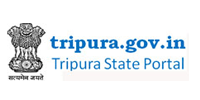Site Visitors : 58454
Main Content
About Us
Profile :
The activities of the office of the Chief Inspector of Factories had started in Tripura in 1951 in a modest way. The Tripura Factories Rules under the Factories Act, 1948 were framed by the Government in 1952. In the beginning, there was only one enforcement officer in the rank of Inspector of Factories while the Director of Industries used to function as Chief Inspector of Factories up to 1966 by virtue of a statutory appointment. Thereafter, the District Magistrate & Collector, Tripura and then District Magistrate & Collector, West Tripura was appointed to exercise the powers of Chief Inspector of Factories. This continued up to 1978. For enforcement of Indian Boilers Act & Regulation, the Chief Inspector of Boilers, Assam was working as the Chief Inspector of Boilers for Tripura in addition since 1955. From 1979 to 1986, the Labour Commissioner functioned as Chief Inspector of Factories in addition by virtue of statutory appointment. The office of the Chief Inspector of Factories became an independent Directorate in 1981. The Inspector of Factories, Tripura, after acquiring specialised qualifications and training on boilers took over the charge of Chief Inspector of Boilers in 1985. Finally, recruitment to the regular combined technical post of Chief Inspector of Factories & Boilers was made in 1987. In 1992, 2 district offices in North & South Tripura District were opened. The Factories & Boilers Directorate was shifted from rented building to its newly constructed government building at Gorkhabasti office complex in 1994.
Corporate Objectives:
- Ensuring safety and hazard free working conditions to the workers engaged in the factories.
- Ensuring safety to the people living in the vicinity of factories & industries.
- To impart mass education on safety and industrial hygiene to the workers, management and public with a view to arousing safety consciousness.
- Ensuring realisation of compensation from managements for payment to the injured workers or dependents of deceased workers in case of accidents.
- Removal of exploitation of factory workers by the Occupiers/Management in respect of extra duties, engagement during prohibited hours, leave with wages etc.
- Ensuring safety in manufacture, maintenance and use of Boilers and Pressure Vessels for prevention of dangerous accidents in factories & industry.
- Back To Previous Page
- |
-
Page Last updated date : 10-08-2022 13:18 pm
Footer External Logos
Page Last Update & Site visitors
Website last updated date : 22-09-2025 13:15 pm





